Key facts of Hepatitis A
- Hepatitis A is an inflammation of the liver that can cause mild to severe illness.
- The hepatitis A virus (HAV) is transmitted through ingestion of contaminated food and water or through direct contact with an infectious person.
- Almost everyone recovers fully from hepatitis A with lifelong immunity. However, a very small proportion of people infected with hepatitis A could die from fulminant hepatitis.
- The risk of hepatitis A infection is associated with a lack of safe water and poor sanitation and hygiene (such as contaminated and dirty hands).
- A safe and effective vaccine is available to prevent hepatitis A.
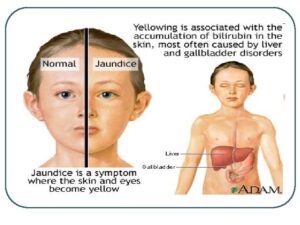

In this blog, we will discuss the hepatitis A vaccine. What are different brands, price points, vaccination schedules, how effective it is, and many more things? I’m Dr. Vinit Mehta, Pediatrician in Vadodara. Let us know in detail about the Hepatitis A vaccine:
OVERVIEW OF HEPATITIS A DISEASE
HOW HEPATITIS A SPREADS (TRANSMISSION/ EXPOSURE)
HEPATITIS A DISEASE SYMPTOMS
HOW TO DIAGNOSE & TREAT HEPATITIS A
HEPATITIS A VACCINATION / PREVENTION
TYPES OF HEPATITIS A VACCINE
HEPATITIS A VACCINE SCHEDULE
HEPATITIS A VACCINE SIDE EFFECTS
HEPATITIS A VACCINE & INTERNATIONAL TRAVEL
WHO RESPONSE TO HEPATITIS
CONCLUSION
OVERVIEW OF HEPATITIS A DISEASE
Hepatitis A is an inflammation of the liver caused by the hepatitis A virus (HAV). The virus is primarily spread when an uninfected (and unvaccinated) person ingests food or water that is contaminated with the feces of an infected person. The disease is closely associated with unsafe water or food, inadequate sanitation, poor personal hygiene, and oral-anal sex.
Unlike hepatitis B and C, hepatitis A does not cause chronic liver disease but it can cause debilitating symptoms and rarely fulminant hepatitis (acute liver failure), which is often fatal. WHO estimates that in 2016, 7134 persons died from hepatitis A worldwide (accounting for 0.5% of the mortality due to viral hepatitis).
Hepatitis A occurs sporadically and in epidemics worldwide, with a tendency for cyclic recurrences. Epidemics related to contaminated food or water can erupt explosively, such as the epidemic in Shanghai in 1988 that affected about 300 000 people. They can also be prolonged, affecting communities for months through person-to-person transmission. Hepatitis A viruses persist in the environment and can withstand food production processes routinely used to inactivate or control bacterial pathogens.
Geographical distribution
Geographical distribution areas can be characterized as having high, intermediate, or low levels of hepatitis A virus infection. However, the infection does not always mean disease because infected young children do not experience any noticeable symptoms.
Infection is common in low- and middle-income countries with poor sanitary conditions and hygienic practices, and most children (90%) have been infected with the hepatitis A virus before the age of 10 years, most often without symptoms. Infection rates are low in high-income countries with good sanitary and hygienic conditions. The disease may occur among adolescents and adults in high-risk groups, such as persons who inject drugs (PWID), men who have sex with men (MSM), people traveling to areas of high endemicity, and in isolated populations, such as closed religious groups. In the United States of America, large outbreaks have been reported among persons experiencing homelessness. In middle-income countries and regions where sanitary conditions are variable, children often escape infection in early childhood and reach adulthood without immunity.
What is hepatitis?
Hepatitis means inflammation of the liver. When the liver is inflamed or damaged, its function can be affected. Heavy alcohol use, toxins, some medications, and certain medical conditions can cause hepatitis, but it is often caused by a virus. The most common hepatitis viruses are hepatitis A virus, hepatitis B virus, and hepatitis C virus.
What is the difference between hepatitis A, hepatitis B, and hepatitis C?
Hepatitis A, hepatitis B, and hepatitis C are liver infections caused by three different viruses. Although each can cause similar symptoms, they are spread in different ways and can affect the liver differently. Hepatitis A is usually a short-term infection and does not become chronic. Hepatitis B and hepatitis C can also begin as short-term, acute infections, but in some people, the virus remains in the body, resulting in chronic disease and long-term liver problems. There are vaccines to prevent hepatitis A and hepatitis B; however, there is no vaccine for hepatitis C.
The page “What is hepatitis?” more information about the differences between hepatitis A, hepatitis B, and hepatitis C.
WHAT IS HEPATITIS A?
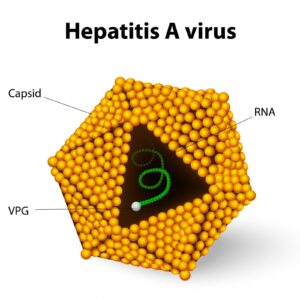

Hepatitis A is a highly contagious, short-term liver infection caused by the hepatitis A virus.
How serious is hepatitis A?
People who get hepatitis A may feel sick for a few weeks to several months but usually recover completely and do not have lasting liver damage. In rare cases, hepatitis A can cause liver failure and even death; this is more common in older people and in people with other serious health issues, such as chronic liver disease.
How common is hepatitis A in the United States?
In 2018, a total of 12,474 hepatitis A cases were reported in the United States. Because some people don’t ever get diagnosed, the actual number of cases reported in that year is probably closer to 24,900. Since 2016, person-to-person outbreaks of hepatitis A have been occurring across the United States mainly among people who use injection drugs or are experiencing homelessness, resulting in more than 32,000 cases.
Are cases of hepatitis A increasing in the United States?
Since the hepatitis A vaccine was first recommended in 1996, cases of hepatitis A in the United States declined dramatically. Unfortunately, in recent years the number of people infected has been increasing because there have been multiple outbreaks of hepatitis A in the United States resulting from person-to-person contact, especially among people who use drugs, people experiencing homelessness, and men who have sex with men.
HEPATITIS A IN GUJARATI
Hepatitis A એટલે સાદો કમળો. આ અત્યંત ચેપી, ટૂંકા ગાળાના યકૃત ચેપ છે,જે વાયરસ ના લીધે થાય છે. તેનો ફેલાવો ગંદા ખોરાક અને પીણા, અશુદ્ધતા અને અસ્વચ્છતાને કારણે થાય છે.
HEPATITIS A IN HINDI
हेपेटाइटिस ए साधारण पीलिया है। यह एक वायरस के कारण होने वाला एक अत्यधिक संक्रामक, अल्पकालिक यकृत संक्रमण है। इसका फैलाव गंदी खान-पिने,अशुद्धता और अस्वच्छता से होता है।
HOW DOES HEPATITIS A SPREADS? (Transmission / Exposure)
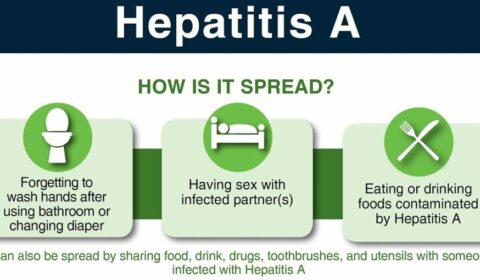

How is hepatitis A spread?
The hepatitis A virus is found in the stool and blood of people who are infected. The hepatitis A virus is spread when someone ingests the virus (even in amounts too small to see) through:
►Person-to-person contact
Hepatitis A can be spread from close, personal contact with an infected person, such as through certain types of sexual contact (like oral-anal sex), caring for someone who is ill, or using drugs with others. Hepatitis A is very contagious, and people can even spread the virus before they feel sick.
►Eating contaminated food or drink
Contamination of food with the hepatitis A virus can happen at any point: growing, harvesting, processing, handling, and even after cooking. Contamination of food and water happens more often in countries where hepatitis A is common. Although uncommon, foodborne outbreaks have occurred in the United States from people eating contaminated fresh and frozen imported food products.
Who is at high risk for hepatitis A?
Although anyone can get hepatitis A, certain groups of people are at higher risk for getting infected and for having the severe disease if they do get hepatitis A.
People at increased risk for hepatitis A
- International travelers
- Men who have sex with men
- People who use or inject drugs (all those who use illegal drugs)
- People with occupational risk for exposure
- People who anticipate close personal contact with an international adoptee
- People experiencing homelessness
People at increased risk for severe disease from hepatitis A infection
- People with chronic liver disease, including hepatitis B and hepatitis C
- People with HIV
What should I do if I think I have been exposed to hepatitis A virus?
If you think you have been exposed to the hepatitis A virus, call your health professional or your local Pediatrician as soon as possible, ideally within 2 weeks. A health professional can decide the next steps based on your age and overall health.
Can I prevent infection after exposure to the hepatitis A virus?
A single shot of the hepatitis A vaccine can help prevent hepatitis A if given within 2 weeks of exposure. Depending upon your age and health, your doctor may recommend immune globulin in addition to the hepatitis A vaccine.
If I have had hepatitis A in the past, can I get it again?
No. Once you recover from hepatitis A, you develop antibodies, protecting you for life.
How long does hepatitis A virus survive outside the body?
The hepatitis A virus can survive outside the body for months. Heating food and liquids to temperatures of 185°F (85°C) for at least 1 minute can kill the virus. Exposure to freezing temperatures does not kill the virus.
HEPATITIS A SYMPTOMS
What are the symptoms of hepatitis A?
Not everyone with hepatitis A has symptoms. Adults are more likely to have symptoms than children. If symptoms develop, they usually appear 2 to 7 weeks after infection. Symptoms usually last less than 2 months, although some people can be ill for as long as 6 months.
If symptoms develop, they can include:
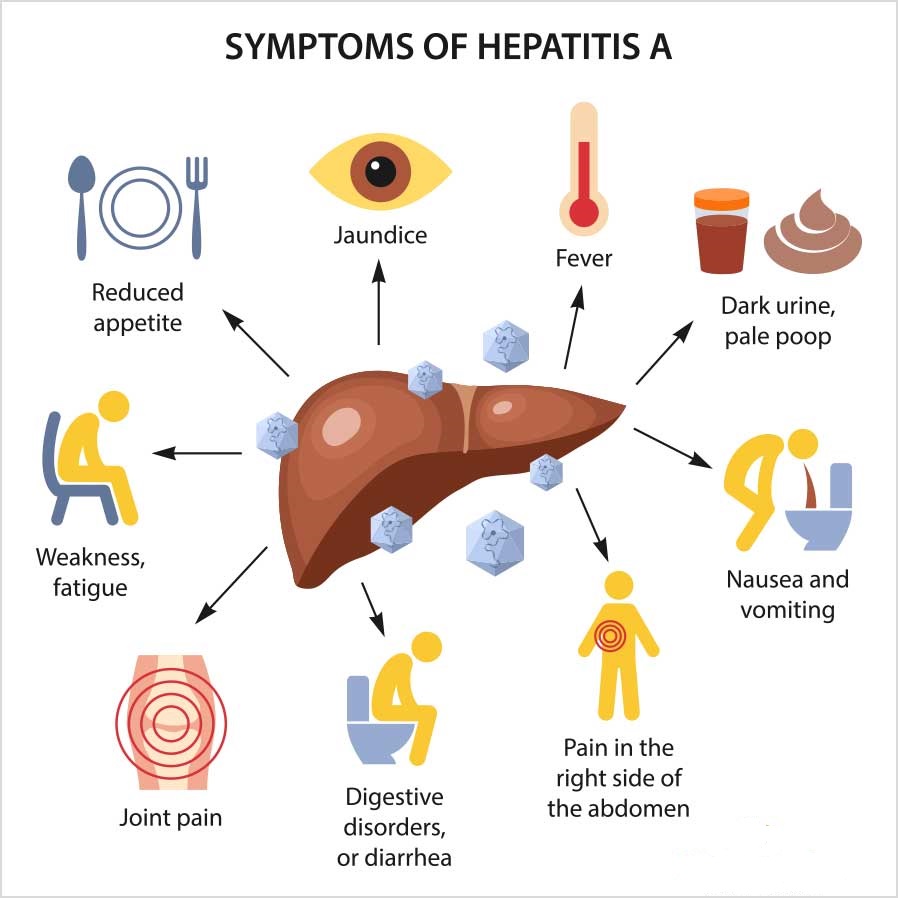

- Yellow skin or eyes
- Not wanting to eat
- Upset stomach
- Throwing up
- Stomach pain
- Fever
- Dark urine or light- colored stools
- Diarrhea
- Joint pain
- Feeling tired
Can a person spread hepatitis A virus without having symptoms?
Yes. Many people, especially children, have no symptoms but can still spread the infection. In addition, a person can transmit the hepatitis A virus to others up to 2 weeks before symptoms appear.
Adults have signs and symptoms of illness more often than children. The severity of disease and fatal outcomes are higher in older age groups. Infected children under 6 years of age do not usually experience noticeable symptoms, and only 10% develop jaundice. Hepatitis A sometimes relapses, meaning the person who just recovered falls sick again with another acute episode. This is normally followed by recovery.
HOW TO DIAGNOSE & TREAT HEPATITIS A?
How is hepatitis A diagnosed?
A doctor can determine if you have hepatitis A by discussing your symptoms and ordering a blood test that can tell whether you have been recently infected with the virus that causes hepatitis A. Serum HAV IgM is done to confirm a recent Hepatitis A infection in an individual. Other blood tests are also ordered like Complete Blood Count, Liver function tests (Like SGOT/SGPT, S. Bilirubin), PT/INR, and other tests based on complications.
How is hepatitis A treated?
To treat the symptoms of hepatitis A, doctors usually recommend rest, adequate nutrition, and fluids. Some people with severe symptoms will need medical care in a hospital.
Can discuss bout diagnosis and treatment related to Hepatitis A in detail with your local pediatrician.
HEPATITIS A VACCINATION
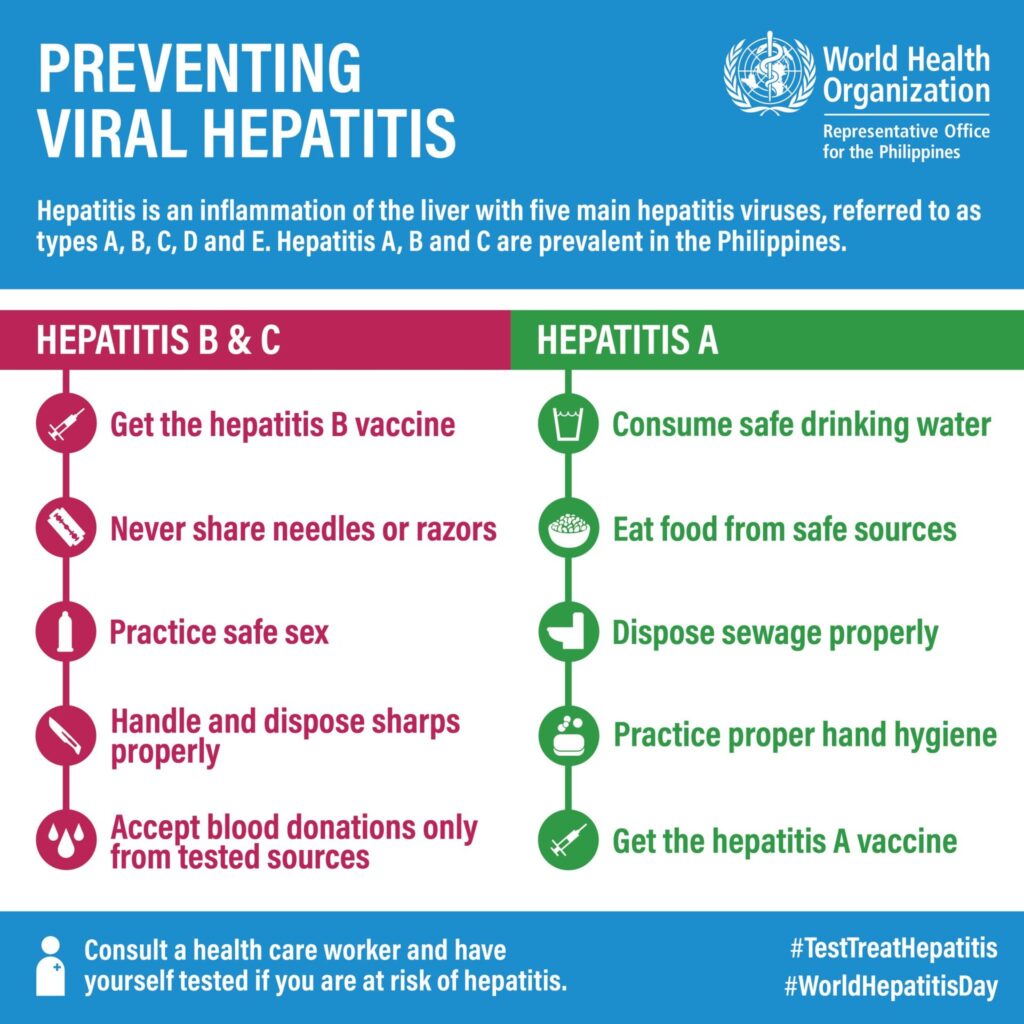

TYPES OF HEPATITIS A VACCINE
Mainly there are 2 types of vaccine: one is the inactivated vaccine and the second is the live attenuated vaccine.
There are 2 brands in INACTIVATED VACCINE group:
AVAXIM (by Sanofi)
HAVRIX 720 (by GSK)
While the LIVE ATTENUATED VACCINE group consists of only one brand:
BIOVAC A (By Dr Reddy)
INACTIVATED HEPATITIS A VACCINE – AVAXIM
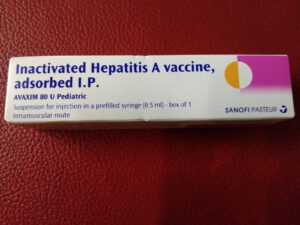

This vaccine provides protection against Hepatitis A that commonly causes disease in children and adults. It’s given in two doses 6 months apart in children and in adults.
Avaxim is recommended for:
child above 12 months. The primary schedule includes 2 doses, first at 12 months and second at 18 months
Avaxim (Hepatitis A) price in India
MRP 1700/- (Doctor may charge from 1800 to 2200/- based on their knowledge, experience, and availability)
INACTIVATED HEPATITIS A VACCINE – HAVRIX 720
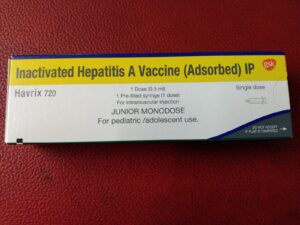

This vaccine provides protection against Hepatitis A that commonly causes disease in children and adults. It’s given in two doses 6 months apart in children and in adults.
Havrix- 720 is recommended for:
child above 12 months. The primary schedule includes 2 doses, first at 12 months and second at 18 months
Havrix- 720 (Hepatitis A) price in India
MRP 2100/- (Doctor may charge from 2200 to 2600/- based on their knowledge, experience, and availability)
LIVE ATTENUATED HEPATITIS A VACCINE – BIOVAC A
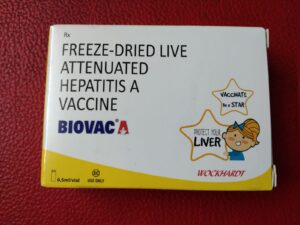

This vaccine provides protection against Hepatitis A that commonly causes disease in children and adults. It’s given in single doses in children.
Biovac A is recommended for:
child above 12 months as a single dose applicable only till the age of 15 years.
Biovac A (Hepatitis A) price in India
MRP 1600/- (Doctor may charge from 1600 to 2000/- based on their knowledge, experience, and availability)
HEPATITIS A VACCINE SCHEDULE
The routine Primary Vaccine schedule for children is a 2 dose schedule (with inactivated vaccine) given 6 months apart i.e. first dose at 12 months and the second dose at 18 months of age. Otherwise a single dose after 12 months of age (till 15 years of age) for the live attenuated vaccine.
FOLLOW UP VACCINATION OR MISSED DOSES
For children who were given no doses of hepatitis A vaccine during the early year of life can also be vaccinated with Hepatitis A vaccine. Also, adults till 45 years of age can be vaccinated with Inactivated Hepatitis A vaccine, 2 doses 6-month apart.
HEPATITIS A VACCINE SIDE EFFECTS
There are no major side effects with Hepatitis A vaccine that have been noticed. Soreness at the injection site and fever (in less than 10% of the cases) has been noticed.
Live attenuated vaccine has side effects same as that noticed in other live vaccines. However, been used only in India, not in other foreign countries.
FAQS ON HEPATITIS A VACCINE
How can I protect myself against hepatitis A?
The best way to prevent hepatitis A is through vaccination with the hepatitis A vaccine. To get the full benefit of the hepatitis A vaccine, more than one shot is needed. The number and timing of these shots depend on the type of vaccine you are given. Practicing good hand hygiene — including thoroughly washing hands after using the bathroom, changing diapers, and before preparing or eating food — plays an important role in preventing the spread of hepatitis A.
Who should get vaccinated against hepatitis A?
The following people should be vaccinated against hepatitis A:
Children
- All children aged 12–23 months
- All children and adolescents 2–18 years of age who have not previously received hepatitis A vaccine (known as “catch up” vaccination)
People at increased risk for hepatitis A
Hepatitis A vaccine is recommended for the following people:
- All children aged 12–23 months
- Unvaccinated children and adolescents aged 2–18 years
- International travelers
- Men who have sex with men
- People who use injection or non-injection drugs
- People who have an occupational risk for infection
- People who anticipate close contact with an international adoptee
- People experiencing homelessness
- People with HIV
- People with chronic liver disease
- Any person wishing to obtain immunity (protection)
In addition, a person who has not previously received hepatitis A vaccine and who has direct contact with someone with hepatitis A should get hepatitis A vaccine within 2 weeks after exposure.
Hepatitis A vaccine may be given at the same time as other vaccines.
People at increased risk for severe disease from hepatitis A infection
Other people recommended for vaccination
- Pregnant women at risk for hepatitis A or risk for the severe outcome from hepatitis A infection
- Any person who requests vaccination
How is the hepatitis A vaccine given?
There are two types of hepatitis A vaccine. The first type, the single-dose hepatitis A vaccine, is given as two shots, 6 months apart, and both shots are needed for long-term protection against hepatitis A. The other type is a combination vaccine that protects people against both hepatitis A and hepatitis B. Combination vaccine is not available in India. The combination vaccine can be given to anyone 18 years of age and older and is given as three shots over 6 months. All three shots are needed for long-term protection for both hepatitis A and hepatitis B.
Is the hepatitis A vaccine effective?
Yes, both types of hepatitis A vaccine are highly effective in preventing hepatitis A virus infection. Receiving the entire vaccine series (all of the required shots) results in long-term protection.
Is the hepatitis A vaccine safe?
Yes, the hepatitis A vaccine is safe. No serious side effects have been reported from the hepatitis A vaccine. Soreness at the injection site is the most common side effect reported. As with any medicine, there is always a small risk that a serious problem could occur after someone gets the vaccine. However, the potential risks of hepatitis A are much greater than the potential risks associated with the hepatitis A vaccine. Millions of doses of hepatitis A vaccine have been given in the United States and worldwide since the first hepatitis A vaccine was licensed in 1995.
Who should not receive the hepatitis A vaccine?
People who have ever had a life-threatening allergic reaction to the hepatitis A vaccine or who are known to be allergic to any part of the hepatitis A vaccine should not receive the vaccine. Tell your doctor if you have any severe allergies. Also, the vaccine is not licensed for use in infants under age 1 year.
What is immune globulin?
Immune globulin is a substance made from human blood plasma that contains antibodies, which are the body’s natural defense against infection. Injections of immune globulin may be given under certain circumstances, like when someone is too young to get vaccinated or can’t get vaccinated because of a previous, life-threatening reaction to the hepatitis A vaccine or vaccine component. Unlike the hepatitis A vaccine, immune globulin does not provide long-term protection against infection.
Will the hepatitis A vaccine protect me from other forms of hepatitis?
No. The hepatitis A vaccine only protects against hepatitis A. There is a separate vaccine available for hepatitis B. There is also a combination hepatitis A and hepatitis B vaccine that offers protection for both viruses. There is no vaccine for hepatitis C at this time.
Can hepatitis A vaccine be given to people with compromised immune systems, such as hemodialysis patients or people with HIV/AIDS?
Yes. The hepatitis A vaccine can be given to people with compromised immune systems.
Is it harmful to have an extra dose of the hepatitis A vaccine or to repeat the entire hepatitis A vaccine series?
No, getting extra doses of the hepatitis A vaccine is not harmful.
What should be done if the last dose of the hepatitis A vaccine is delayed?
If the second dose has been delayed (more than 6 months since the first dose was given), it should be given as soon as possible. The first dose does not need to be given again.
Where can I get the hepatitis A vaccine?
Speak with your healthcare provider or call your local public health department, where free or low-cost vaccines for adults may be offered. For children, check to your local pediatrician.
HEPATITIS A VACCINE AND INTERNATIONAL TRAVEL
Who should get the hepatitis A vaccine before traveling internationally?
All unvaccinated people, along with those who have never had hepatitis A, should be vaccinated before traveling to countries where hepatitis A is common. Travelers to urban areas, resorts, and luxury hotels in countries where hepatitis A is common are still at risk. International travelers have been infected, even though they regularly washed their hands and were careful about what they drank and ate. Those who are too young or can’t get vaccinated because of a previous, life-threatening reaction to the hepatitis A vaccine or vaccine component should receive immune globulin. Travelers to other countries where hepatitis A does not commonly occur are not recommended to receive the hepatitis A vaccine before travel.
How soon before travel should I get the hepatitis A vaccine?
You should get the first dose of the hepatitis A vaccine as soon as you plan international travel to a country where hepatitis A is common. The vaccine will provide some protection even if you get vaccinated closer to departure. For older adults (age >40 years), people who are immunocompromised, and people with chronic liver disease or other chronic medical conditions the healthcare provider may consider, based on several factors, giving an injection of immune globulin at the same time in different limbs.
What should I do if I am traveling internationally but cannot receive the hepatitis A vaccine?
People who are allergic to a vaccine component or are younger than 6 months should receive a single dose of immune globulin before traveling to a country where hepatitis A is common. Immune globulin provides effective protection against hepatitis A virus infection for up to 2 months, depending on the dosage given. If you are staying longer than 2 months, you can get another dose of immune globulin during your visit for continued protection against hepatitis A.
WHO RESPONSE TO HEPATITIS A
In May 2016, the World Health Assembly adopted the first Global health sector strategy on viral hepatitis, 2016-2021. The strategy highlights the critical role of universal health coverage and the targets of the strategy are aligned with those of the Sustainable Development Goals. The strategy has a vision of eliminating viral hepatitis as a public health problem. This is reflected in the global targets of reducing new viral hepatitis infections by 90% and reducing deaths due to viral hepatitis by 65% by 2030. Actions to be taken by countries and WHO Secretariat to reach these targets are outlined in the strategy.
WHO is working in the following areas to support countries in moving towards achieving the global hepatitis goals under the Sustainable Development Agenda 2030:
- raising awareness, promoting partnerships, and mobilizing resources;
- formulating evidence-based policy and data for action;
- increasing health equities within the hepatitis response;
- preventing transmission; and
- scaling up screening, care and treatment services.
WHO published the Progress report on HIV, viral hepatitis, and sexually transmitted infections, 2021 outlining its progress towards elimination. The report sets out global statistics on viral hepatitis B and C, the rate of new infections, the prevalence of chronic infections, and mortality caused by these 2 high-burden viruses, as well as coverage of key interventions, all current as of the end of 2020.
Since 2011, together with national governments, civil society, and partners, WHO have organized annual World Hepatitis Day campaigns (as 1 of its 9 flagship annual health campaigns) to increase awareness and understanding of viral hepatitis.
